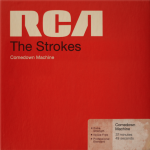
The Strokes Comedown Machine
(RCA)
Had a Goodyear-sized blimp of grand magnitude read “saviors of rock” over a packed arena while the Strokes played, I’d say it was entirely deserved. It was a cause for celebration. May I offer an apocalyptic image of 2001 had the Strokes failed to exist: the sometimes-asphyxiating insularity of indie rock was barely treading water in the form of bands like Circulatory System and Dismemberment Plan, while on the other side of the coin, Staind and Tool were the ones tearing up the mainstream rock charts thanks to uninformed mothers buying their crestfallen sons birthday presents. The indie class offered spiritual introspection and the rock class brought wails of anguish. But we were yearning for more color, and even more so after the grim Y2k scare, a defining new band to live vicariously through and excite our thinning new century resolutions. How are those going for you, by the way?
And the answer we were looking for came in the form of…the Ramones? Watch that $2 bill taping again and tell me the future didn’t look bright – a quintet of affluent, stylish poseurs with all-too-convenient Italian last names perfected the 70’s punk identikit by playing two minute pop bursts of joy with a façade of indifference. Go ahead and hit them with your best shot. They were privileged bachelors playing garage band while RCA conveniently nourished them the big bucks, but tell me that the hooks weren’t bang-on with a straight face. The formula they brought to the table was too perfect; they would’ve called it a day right there and they’d still be legends. And just like that, the dreaded curse of hype (damn the UK!) was inflicted upon them with so much as a fingersnap. The Strokes would be forever immortalized like a faded tube color camera image, except that they prevailed. But here’s the caveat - the prospect of the Strokes still performing in 2013 doesn’t sound too sexy, now does it?
In fact, they may not even exist at all. The tacked-on cover of the Strokes’ fifth release, Comedown Machine, looks like an unreleased test pressing gathering dust in the RCA archives, meant to be unearthed as “that lost Strokes album” once the reissue series begins to kick in. The locked, forgotten classic would easily fetch for thousands, but seeing as Comedown Machine is very, very real, it desperately screams bargain bin fodder right as it hits record shelves. Just like the band itself, it presents something of an ongoing identity crisis for the band, one that hasn’t figured out how to advance their sound except to put more meat on the bones – the production of latter efforts stripped Gordon Raphael’s skeletal, bare bones approach with juiced-up hooks and louder guitar dynamics. And while Angles was greatly misunderstood as their misguided return (and not to form) – it came pre-packaged with the tainted repute of a band coping with conflict - it’s actually the one record in their canon that, in retrospect, holds up better than its given credit for.
Whether for their benefit or not, The Strokes have mostly been incautious when gambling with new directions. And they approach Comedown Machine like that of a imprudent child who avoids the “choking hazard” label, experimenting with new tricks whilst letting misinformed sources guide them through the process. It’s been widely reported that there’s more of a new wave flavor, and it shows in Tap Out, in which Albert Hammond Jr.’s sleek guitar flourishes skid around a chorus that’s eerily familiar to Cruel Summer, sans the effervescent glow of Bananarama. Moreover, they do make the effort to sound new wave in Welcome to Japan like picking the pieces of a broken language, and not even Julian Casablancas’ vaguely sexualized, but mostly nonsensical musings fail to inject much humor into the quirks of the land they wish to venerate.
Strip about a third of Comedown Machine and you’re left with songs that emulate the Strokes’ past trajectory, and unsurprisingly, with haphazard production values. The tepid All the Time has the sort of mechanized sheen that makes great ad material, though at least it packs a walloping chorus that will make plenty of fans rise to their feet. 50/50 has a bouncy, grunge-inflected chug that at least isn’t bogged in excess, though it features one of Casablancas’ most wretched vocal performances – his faux-incensed rebellion fails to make an impression, as he’s apparently shouting from the inside of a tin can. They’re both made a touch more palatable thanks to Fabrizio Moretti’s fearless drumming, who continues to be the band’s best asset when tackling their more hard-hitting cuts. But the best track in Comedown Machine goes to Partners in Crime, which starts with a sneering, glammed up guitar part before it breaks into a synth-like melodic riff reminiscent of 12:51 over a jaunty rock n’ roll groove.
Right from the onset, The Strokes knew that achieving the acclaim of their earlier output would be near to impossible. The last few years have been especially problematic, struggling to find a place of reprieve to find any sort of focus. But complacency can be just as reactive as a conflict, and striking a balance, as a whole, doesn’t seem to favor their creative input, either. The Strokes can still occasionally hit the mark when they actually channel themselves as opposed to others – tawdry, flatlined synth tropes like One Way Trigger or musty ballads like Chances aren’t tracks you write when you’re out to re-establish your worth as a class act. Comedown Machine comes off as perfectly uniform compromise, a sigh of exasperation after having the weights on top of their shoulders for too long. Seeing as this ends their contract with RCA, they should continue to rebuild that bond before they transition into their next business agreement. Otherwise, they might as well call it a day.
